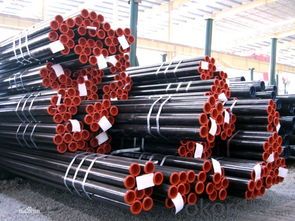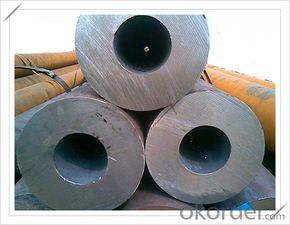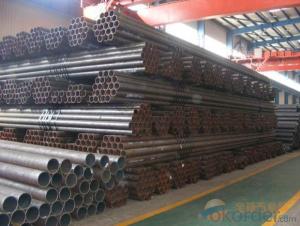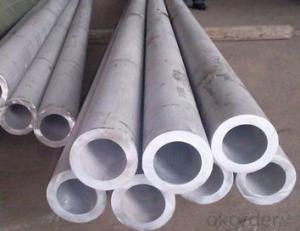API 5L Seamless Carbon Steel Pipe and ERW Steel Pipe
- Loading Port:
- Tianjin
- Payment Terms:
- TT OR LC
- Min Order Qty:
- 25 m.t.
- Supply Capability:
- 10000 m.t./month
OKorder Service Pledge
OKorder Financial Service
You Might Also Like
Product Description:
1、Structure of API 5L Seamless Carbon Steel Pipe and ERW Steel Pipe Description:
Seamless steel pipe is formed by drawing a solid billet over a piercing rod to create the hollow shell. As the manufacturing process does not include any welding, seamless pipes are perceived to be stronger and more reliable. Historically seamless pipe was regarded as withstanding pressure better than other types, and was often more easily available than welded pipe.
2、Main Features of API 5L Seamless Carbon Steel Pipe and ERW Steel Pipe:
• High manufacturing accuracy
• High strength
• Small inertia resistance
• Strong heat dissipation ability
• Good visual effect
• Reasonable price
3、 API 5L Seamless Carbon Steel Pipe and ERW Steel Pipe Images:


Packaging & Delivery
Packaging Details: | seaworthy package,bundles wrapped with strong steel strip |
Delivery Detail: | 15-30days after received 30%TT |
4、API 5L Seamless Carbon Steel Pipe and ERW Steel Pipe Specification:
Standard | GB, DIN, ASTM |
Grade | 10#-45#, 16Mn |
Thickness | 8 - 33 mm |
Section Shape | Round |
Outer Diameter | 133 - 219 mm |
Place of Origin | Shandong, China (Mainland) |
Secondary Or Not | Non-secondary |
Application | Hydraulic Pipe |
Technique | Cold Drawn |
Certification | API |
Surface Treatment | factory state or painted black |
Special Pipe | API Pipe |
Alloy Or Not | Non-alloy |
Length | 5-12M |
Outer Diameter | 21.3-610mm |
Grade | 20#, 45#, Q345, API J55, API K55, API L80, API N80, API P110, A53B |
Standard | ASME, ASTM |
1.Material:20#(ASTM A 106/A53 GRB.API5LGRB,GB),45#,16Mn,10#.
2.Specification range:OD:21.3-610mm,WT:6-70mm,length:6-12m or according to the requirement of clients.
3.Excutive standards:GB,ASME API5L.ASTM A 106/A53,Despite of the above standards,we can also supply seamless steel pipe with standard of DIN,JIS,and so on,and also develop new products according to the requirements of our clients!
4.Surface:black lacquered,varnish coating or galvanized.
5.Ends:Beveled or square cut,plastic capped,painted.
6.Packing:bundles wrapped with strong steel strip,seaworthy packing.
5、FAQ of API 5L Seamless Carbon Steel Pipe and ERW Steel Pipe:
①How is the quality of your products?
Our products are manufactured strictly according to national and internaional standard, and we take a test
on every pipe before delivered out. If you want see our quality certifications and all kinds of testing report, please just ask us for it.
Guaranteed: If products’ quality don’t accord to discription as we give or the promise before you place order, we promise 100% refund.
②How about price?
Yes, we are factory and be able to give you lowest price below market one, and we have a policy that “ for saving time and absolutely honest business attitude, we quote as lowest as possible for any customer, and discount can be given according to quantity”,if you like bargain and factory price is not low enough as you think, just don’t waste your time.Please trust the quotation we would give you, it is professional one.
③Why should you chose us?
Chose happens because of quality, then price, We can give you both.Additionally, we can also offer professional products inquiry, products knowledge train(for agents), smooth goods delivery, exellent customer solution proposals.Our service formula: good quality+good price+good service=customer’s trust
SGS test is available, customer inspection before shipping is welcome, third party inspection is no problem.
Any question, pls feel free to contact us !
- Q:How are steel pipes used in the construction of sewer systems?
- Steel pipes are commonly used in the construction of sewer systems due to their durability and strength. They are used to transport wastewater and sewage from buildings to treatment plants or disposal sites. Steel pipes are resistant to corrosion and can withstand high pressure, making them ideal for underground applications. Additionally, their smooth interior prevents clogs and blockages, ensuring efficient flow and preventing damage to the sewer system.
- Q:Can steel pipes be used for underground cooling systems?
- Yes, steel pipes can be used for underground cooling systems. Steel pipes are commonly used in various applications, including underground cooling systems, due to their durability, strength, and resistance to corrosion. They can effectively handle the high pressure and temperature demands of cooling systems. Additionally, steel pipes can be welded or threaded together, allowing for easy installation and maintenance. However, it is important to ensure that the steel pipes are properly coated or insulated to prevent corrosion and maintain efficiency in heat transfer.
- Q:How do steel pipes differ from other types of pipes?
- Steel pipes differ from other types of pipes in a few key ways. Firstly, steel pipes are known for their strength and durability. They have a high resistance to heat, pressure, and corrosion, making them suitable for a wide range of applications. This strength also allows steel pipes to withstand heavy loads and provide a long service life. Another distinguishing feature of steel pipes is their versatility. Steel pipes can be manufactured in various shapes and sizes to meet specific project requirements. This adaptability makes them a popular choice for a wide range of industries, including construction, oil and gas, water treatment, and manufacturing. Steel pipes also offer excellent thermal conductivity, meaning they can efficiently transfer heat from one area to another. This makes them suitable for applications such as heating and cooling systems, as well as for transporting hot fluids or gases. Furthermore, steel pipes are known for their resistance to fire. They have a high melting point and do not easily catch fire or contribute to the spread of flames. This property is crucial in applications where fire safety is a concern, such as in buildings or industrial facilities. Lastly, compared to other types of pipes, steel pipes have a higher initial cost. However, their long-term benefits, such as their durability and low maintenance requirements, often outweigh the initial investment. Steel pipes are also highly recyclable, making them an environmentally friendly choice. In summary, steel pipes stand out from other types of pipes due to their strength, durability, versatility, excellent thermal conductivity, fire resistance, and recyclability. These qualities make steel pipes a preferred option for a wide range of applications in various industries.
- Q:How are steel pipes protected against external mechanical damage?
- Steel pipes are protected against external mechanical damage through various methods. One common method is the use of protective coatings. These coatings provide a physical barrier between the steel surface and external forces, such as impact or abrasion. Coatings can be applied through processes like painting, epoxy coating, or wrapping the pipe with materials like polyethylene or polypropylene. Another method of protection is the use of external casing or encasement. Casing pipes are installed around the steel pipes to provide an additional layer of protection. These casing pipes are typically made of materials like concrete, PVC, or ductile iron, which are resistant to external mechanical damage. Furthermore, steel pipes can be protected by using supports and restraints. Properly designed supports and restraints help to distribute external forces evenly and prevent excessive stress or deformation on the pipe. This includes using hangers, clamps, or brackets to secure the pipe in place and minimize the risk of mechanical damage. In addition, steel pipes can be protected by implementing measures to prevent accidental impacts or collisions. This can involve installing protective barriers, fencing, or warning signs to alert people to the presence of pipelines and prevent unintentional damage. Overall, a combination of protective coatings, casing, supports, and preventive measures is utilized to ensure that steel pipes are safeguarded against external mechanical damage. These measures help to maintain the structural integrity of the pipes and ensure their long-term performance and reliability.
- Q:How are steel pipes inspected for defects?
- Steel pipes are typically inspected for defects using various non-destructive testing methods such as ultrasonic testing, magnetic particle inspection, and visual inspection. These techniques help identify any cracks, corrosion, or other defects in the pipes, ensuring their structural integrity and quality.
- Q:What is the weight of hot galvanized steel tubes? DN150 4mm wall thickness
- DN150 4mm wall thickness welded steel pipe theoretical weight is 16.21kg/m, galvanized steel pipe should be multiplied by the weight coefficient after galvanizing, C, DN150, wall thickness of 4mm, C=1.032, DN150, theoretical weight and wall thickness of 4mm galvanized steel is 1.02*16.21=16.7287kg/m = 16.73kg/m.
- Q:What are the common factors affecting the flow capacity of steel pipes?
- There are several common factors that can affect the flow capacity of steel pipes. 1. Pipe Diameter: The diameter of the pipe is one of the most significant factors affecting flow capacity. The larger the diameter, the greater the flow capacity as there is more area for the fluid to pass through. 2. Pipe Length: The length of the pipe also plays a role in flow capacity. Longer pipes generally have higher frictional losses, which can reduce the flow capacity. 3. Surface Roughness: The internal surface roughness of the steel pipe can impact flow capacity. Rough surfaces create more friction, which can reduce the flow rate. Smooth pipes, on the other hand, allow for smoother flow and higher flow capacity. 4. Fluid Properties: The properties of the fluid being transported through the steel pipe can affect flow capacity. Factors such as viscosity, temperature, and density can impact the flow rate. For example, highly viscous fluids will have lower flow capacity compared to less viscous fluids. 5. Pressure Drop: Pressure drop along the length of the pipe is another factor that affects flow capacity. As fluid flows through the pipe, there may be pressure losses due to friction, bends, or restrictions. Higher pressure drops result in lower flow capacity. 6. Pipe Material and Wall Thickness: The material of the steel pipe and its wall thickness can influence flow capacity. Different materials have different properties that can affect flow rates. Additionally, thicker walls can reduce the internal diameter of the pipe, resulting in lower flow capacity. 7. Pipe Layout and Fittings: The design and layout of the pipe system, including the presence of fittings such as valves, elbows, and tees, can impact flow capacity. These fittings can cause additional pressure drops and turbulence, reducing the overall flow rate. It is important to consider these factors when designing or evaluating a steel pipe system to ensure optimal flow capacity and efficiency.
- Q:How are steel pipes resistant to corrosion?
- Steel pipes are resistant to corrosion due to a combination of factors. Firstly, steel pipes are often coated with a protective layer, such as zinc or epoxy, which acts as a barrier between the steel and the surrounding environment. This coating prevents moisture and other corrosive substances from coming into contact with the steel, reducing the chances of corrosion. Additionally, the composition of steel itself plays a role in its corrosion resistance. Steel is primarily made up of iron, with small amounts of other elements added to enhance its strength and durability. These elements, such as chromium and nickel, create a protective oxide layer on the surface of the steel. This oxide layer acts as a natural barrier, preventing the underlying steel from being exposed to moisture and oxygen, which are key contributors to corrosion. Furthermore, steel pipes can be treated through a process called galvanization, where a layer of zinc is applied to the surface. This zinc coating provides an extra layer of protection against corrosion, as zinc is highly resistant to rust and oxidation. The zinc sacrificially corrodes instead of the steel, further extending the lifespan of the pipe. Overall, the combination of protective coatings, the composition of steel, and galvanization processes all contribute to the corrosion resistance of steel pipes. This makes them highly durable and suitable for various applications, including plumbing, construction, and transportation of fluids and gases.
- Q:How are steel pipes used in the construction of irrigation systems?
- Steel pipes are commonly used in the construction of irrigation systems to transport water from a source, such as a reservoir or well, to the fields or gardens that need to be irrigated. These pipes are durable, strong, and resistant to corrosion, making them ideal for withstanding the pressure and frequent water flow in irrigation systems. They are often used to create mainlines, secondary lines, and lateral lines, ensuring the efficient distribution of water to different areas. Additionally, steel pipes can be easily connected and adapted to various configurations, allowing for flexibility in designing and expanding irrigation networks.
- Q:Can steel pipes be used for irrigation pivot systems?
- Yes, steel pipes can be used for irrigation pivot systems. Steel pipes are often used in irrigation systems due to their strength, durability, and resistance to corrosion. They can withstand the pressure and stress of the water flow in pivot systems and are less prone to leaks or cracks compared to other materials. Additionally, steel pipes can be easily welded or threaded together, making them a convenient choice for irrigation systems that require a variety of lengths and configurations. However, it is important to consider the specific requirements of the irrigation pivot system and consult with professionals to ensure that the chosen steel pipes are suitable for the specific application.
1. Manufacturer Overview |
|
|---|---|
| Location | |
| Year Established | |
| Annual Output Value | |
| Main Markets | |
| Company Certifications | |
2. Manufacturer Certificates |
|
|---|---|
| a) Certification Name | |
| Range | |
| Reference | |
| Validity Period | |
3. Manufacturer Capability |
|
|---|---|
| a)Trade Capacity | |
| Nearest Port | |
| Export Percentage | |
| No.of Employees in Trade Department | |
| Language Spoken: | |
| b)Factory Information | |
| Factory Size: | |
| No. of Production Lines | |
| Contract Manufacturing | |
| Product Price Range | |
Send your message to us
API 5L Seamless Carbon Steel Pipe and ERW Steel Pipe
- Loading Port:
- Tianjin
- Payment Terms:
- TT OR LC
- Min Order Qty:
- 25 m.t.
- Supply Capability:
- 10000 m.t./month
OKorder Service Pledge
OKorder Financial Service
Similar products
New products
Hot products
Related keywords






























